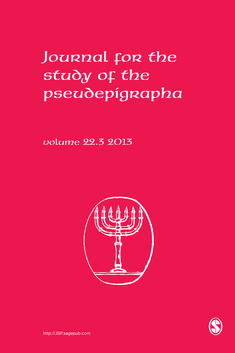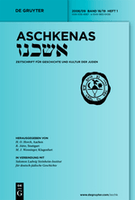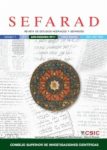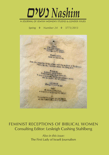
Journal for the Study of Judaism
Scope & Guideline
Fostering Dialogue in the Study of Judaism
Introduction
Aims and Scopes
- Historical Contextualization of Jewish Texts:
The journal emphasizes the significance of historical contexts in understanding Jewish texts, particularly from the Second Temple period and onwards. Scholars analyze how historical events shaped Jewish thought and literature. - Interdisciplinary Approaches:
The journal promotes interdisciplinary methodologies, drawing from archaeology, linguistics, and classics to enrich the study of Jewish texts and cultural practices. - Cultural Interactions and Influences:
A core focus is on the interactions between Jewish and non-Jewish cultures, especially in the Hellenistic and Roman contexts, examining how these influences affected Jewish identity and practices. - Textual Analysis and Interpretation:
The journal includes rigorous textual analysis, including philological studies of Jewish manuscripts, translations, and interpretations of key biblical and rabbinic texts. - Ritual and Religious Practices:
Research on the evolution of Jewish rituals and religious practices during different historical periods is a prominent area, exploring how these practices reflect broader societal changes.
Trending and Emerging
- Global Perspectives on Judaism:
There is a growing interest in examining Judaism within a global context, exploring how Jewish communities interacted with other cultures and religions outside traditional geographical boundaries. - Gender and Identity Studies:
Emerging themes focusing on gender dynamics and identity within Jewish texts and communities are increasingly prevalent, reflecting broader societal discussions on gender roles and identity. - Intertextuality and Reception History:
Recent papers emphasize intertextuality and the reception history of Jewish texts, investigating how these texts have been interpreted and reinterpreted across different periods and cultures. - Environmental and Socio-political Contexts:
An increasing number of studies are considering the environmental and socio-political contexts of ancient Judaism, examining how these factors influenced Jewish thought and practices. - Digital Humanities and Methodological Innovations:
The integration of digital humanities tools and methodologies in the study of Judaism is on the rise, as scholars utilize technology to analyze texts and data in new and innovative ways.
Declining or Waning
- Traditional Historical Narratives:
Themes centered around traditional historical narratives of Judaism, particularly those that do not incorporate contemporary methodologies or interdisciplinary perspectives, seem to be less frequent. Scholars are increasingly favoring critical and nuanced approaches. - Static Views of Jewish Identity:
There appears to be a decline in the exploration of static or monolithic views of Jewish identity. The journal is moving towards more dynamic discussions that consider the fluidity and diversity within Jewish communities throughout history. - Exclusively Textual Studies:
While textual studies remain important, there is a noticeable decrease in papers solely focused on textual criticism without contextual analysis. The trend is shifting toward integrating textual studies with broader cultural and historical insights.
Similar Journals

Journal for the Study of the Pseudepigrapha
Illuminating the Shadows of Canonical ScripturesThe Journal for the Study of the Pseudepigrapha, published by SAGE Publications Ltd, is an esteemed periodical dedicated to advancing the scholarly exploration of pseudepigraphal literature and its impact on religious studies. With an ISSN of 0951-8207 and E-ISSN 1745-5286, this journal provides a vital platform for researchers, professionals, and students alike who seek to deepen their understanding of the diverse literary and theological dimensions of pseudepigrapha. Operating from the United Kingdom, the journal's output spans from 1987 to 2024, ensuring a rich archive of insights and discussions relevant to contemporary debates within the field. It currently holds a categorization in the fourth quartile of Religious Studies (Q4) and ranks 308 out of 644 in the Scopus database, highlighting its established presence among a growing community of scholars. The journal does not currently offer Open Access, though its content remains highly valuable for those engaged in the investigation of ancient texts beyond the canonical scriptures. By fostering rigorous analysis and multifaceted discourse, the Journal for the Study of the Pseudepigrapha continues to make significant contributions to the understanding of identity, tradition, and textual interpretation within various cultural contexts.

Aschkenas-Zeitschrift fuer Geschichte und Kultur der Juden
Enriching Interdisciplinary Perspectives on Jewish CultureAschkenas-Zeitschrift fuer Geschichte und Kultur der Juden, published by WALTER DE GRUYTER GMBH, is a distinguished academic journal that delves into the rich history and cultural heritage of Jewish communities. Based in Germany, this journal is indexed under the ISSN 1016-4987 and E-ISSN 1865-9438, making its contributions accessible to an international audience. Although it currently operates without open access options, the journal serves as an important platform for researchers in the fields of Arts and Humanities, History, Literature and Literary Theory, and Religious Studies, as evidenced by its publication history from 1996 to 2023. While ranked in the fourth quartile across various categories on Scopus, the journal provides critical insights and interdisciplinary approaches that enrich the understanding of Jewish cultural narratives. Researchers, professionals, and students alike will find valuable content that not only highlights historical perspectives but also engages with contemporary cultural discussions. This journal remains a vital resource for those seeking to deepen their knowledge and contribute to ongoing dialogues in Jewish studies.

SEFARAD
Exploring the Depths of Iberian Jewish HeritageSEFARAD, published by the CONSEJO SUPERIOR INVESTIGACIONES CIENTIFICAS-CSIC, is a renowned open-access journal that has been a pivotal platform for scholarly communication since its inception in 1996. Based in Spain, it caters to a diverse readership across multiple disciplines, including Cultural Studies, History, Literature and Literary Theory, Religious Studies, and Linguistics and Language. The journal has successfully established itself within respected academic circles, achieving Q2 rankings in both History and Literature and Literary Theory as per the 2023 category quartiles, emphasizing its significance in these fields. With a commitment to fostering interdisciplinary dialogue and enhancing understanding of the Jewish heritage and culture in the Iberian Peninsula, SEFARAD presents original research articles, comprehensive reviews, and critical essays that inspire further scholarly inquiry. Researchers, professionals, and students alike will find this journal an invaluable resource for contemporary studies in its vibrant subject areas.

Nordisk Judaistik-Scandinavian Jewish Studies
Advancing Scholarship on Jewish Culture and History in the NorthNordisk Judaistik-Scandinavian Jewish Studies is a distinguished academic journal dedicated to the exploration of Jewish culture, history, and religious practices in the Scandinavian context. Published by the DONNER INSTITUTE FOR RESEARCH ON RELIGIOUS AND CULTURAL HISTORY in Finland, this journal has been an open access platform since 2016, allowing easy dissemination of knowledge and fostering scholarly communication among researchers, educators, and students. With a variety of subjects encompassing Anthropology, Cultural Studies, History, and Religious Studies, the journal has achieved commendable recognition, with its latest rankings placing it in Q2 in several categories according to the 2023 Scopus rankings. The journal's significant contribution to the field is evident through its impact, evidenced by its strategic position within its respective quartiles. By bridging interdisciplinary methodologies and Jewish studies within a Scandinavian framework, Nordisk Judaistik serves as an essential resource for those engaged in the complexities and nuances of Jewish heritage and identity in the region.

Images
Engaging with the Complexity of Cultural ExpressionsImages, published by BRILL, serves as a significant academic platform within the realms of Cultural Studies, History, Religious Studies, and the Visual Arts and Performing Arts. With its ISSN 1871-7993 and E-ISSN 1871-8000, this journal is committed to providing a scholarly forum that engages with the complexities of visual representations and their impact on cultural narratives. Though it currently holds a Q4 category ranking across various fields, indicating room for growth, its presence in Scopus rankings showcases its contribution to the arts and humanities, positioning it as a unique voice in interdisciplinary discourse. The journal aims to publish innovative research that fosters dialogue among scholars, practitioners, and students interested in the intersections of visual culture and societal dynamics. Despite its non-open access status, Images remains a vital resource for those seeking to understand the intricate fabric of cultural expressions from historical and contemporary perspectives, offering insights that resonate across academic and artistic landscapes.

Nashim-A Journal of Jewish Womens Studies & Gender Issues
Advancing Scholarship on Gender Issues in Jewish ContextsNashim: A Journal of Jewish Women's Studies & Gender Issues, published by Indiana University Press, stands as a pivotal platform for interdisciplinary scholarship at the intersection of Jewish studies, gender studies, and cultural discourse. With an ISSN of 0793-8934 and e-ISSN 1565-5288, this journal offers a vital repository of research and critical analysis, specifically highlighting the experiences and contributions of Jewish women across historical and contemporary contexts. Although classified in Q4 of the 2023 category quartiles for Arts and Humanities, Cultural Studies, and Gender Studies, it serves to amplify underrepresented voices and themes that are crucial for understanding societal dynamics. The journal spans from 2013 to 2024 and welcomes contributions that engage thoughtfully with gender issues in Jewish contexts, making it an essential resource for researchers, educators, and students alike, who are dedicated to exploring the rich complexities within this field of study. While Open Access is not currently supported, access to its in-depth articles can be sought through institutional databases and libraries, ensuring that its impactful research reaches those who seek it.

JOURNAL OF JEWISH THOUGHT & PHILOSOPHY
Cultivating Insightful Perspectives on Jewish PhilosophyThe JOURNAL OF JEWISH THOUGHT & PHILOSOPHY, published by BRILL, stands as a significant academic resource since its inception in 1993. With the ISSN 1053-699X, this interdisciplinary journal uniquely bridges various fields including Literature and Literary Theory, Philosophy, and Religious Studies, providing a platform for rigorous exploration of Jewish intellectual traditions and their broader cultural implications. Holding esteemed rankings across multiple categories, including Q1 in Literature and Literary Theory and Q2 in Philosophy, the journal appeals to researchers and scholars worldwide. The journal is not open access but is available through numerous academic libraries, making it accessible to those dedicated to advancing knowledge in Jewish thought. By fostering critical discourse and innovative scholarship, it remains an essential resource for understanding complex intersections of faith, ethics, and society from a Jewish perspective.

Judaica Bohemiae
Unveiling the Nuances of Jewish Existence in BohemiaJudaica Bohemiae, published by the Zidovske Muzeum Praze, is a prominent scholarly journal dedicated to the study of Jewish culture, history, and religious practices, with a particular focus on the Czech Republic and Central Europe. Since its relaunch in 2007, the journal has established itself as a valuable resource in the fields of Cultural Studies, History, and Religious Studies, achieving a commendable Q2 ranking across these disciplines in 2023. With its thoughtful compilation of research articles and critical essays, Judaica Bohemiae offers insights into the evolving dynamics of Jewish existence and identity. Although it does not currently operate under an open access model, the journal ensures that its high-quality content remains accessible to researchers, professionals, and students interested in the nuanced intersections of culture and history. By promoting rigorous academic discourse and advancing the understanding of Jewish heritage, Judaica Bohemiae continues to play a crucial role in its field, fostering scholarly connections and illuminating the past for future generations.

Review of Rabbinic Judaism
Engaging Minds with the Complexity of Rabbinic TextsReview of Rabbinic Judaism is a distinguished academic journal published by BRILL, focusing on the intricate history and development of Rabbinic Judaism from its origins to contemporary implications. Since its inception in 1998, it has catered to a broad audience of researchers, professionals, and students interested in the historical and religious dimensions of Judaism. The journal is currently recognized within the Q2 category in both History and Religious Studies as of 2023, indicating its significant role in scholarly discourse. Although it is not an Open Access journal, it remains accessible through various academic institutions and libraries globally. The journal's broad scope allows for diverse articles that explore theological, cultural, and textual analysis, making it a vital resource for those dedicated to the study of Jewish texts and traditions. Located in the Netherlands, Review of Rabbinic Judaism continues to contribute to the academic landscape by fostering a deeper understanding of Rabbinic thought.

Dead Sea Discoveries
Illuminating the Past, One Scroll at a TimeDead Sea Discoveries is a premier academic journal dedicated to advancing the study of the historical, archaeological, and textual aspects of the Dead Sea Scrolls and related literature. Published by BRILL, a leading publisher in the humanities, this journal serves as an essential platform for scholars in the fields of History and Religious Studies, holding a commendable Q2 quartile ranking in both categories as of 2023. With an ISSN of 0929-0761 and an E-ISSN of 1568-5179, the journal has been a vital resource since its inception in 1994, continuously enriching scholarly discourse through rigorous peer-reviewed articles, book reviews, and critical essays. Researchers and students alike will find this publication indispensable for contemporary scholarship, effectively bridging historical insights and religious interpretations. The journal is headquartered in Leiden, Netherlands, and although it does not currently offer Open Access options, it remains a crucial repository of cutting-edge research within its field.